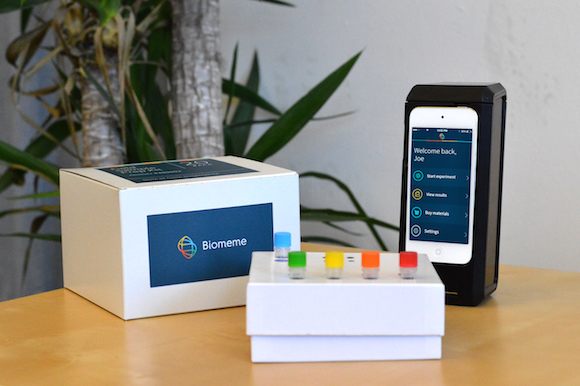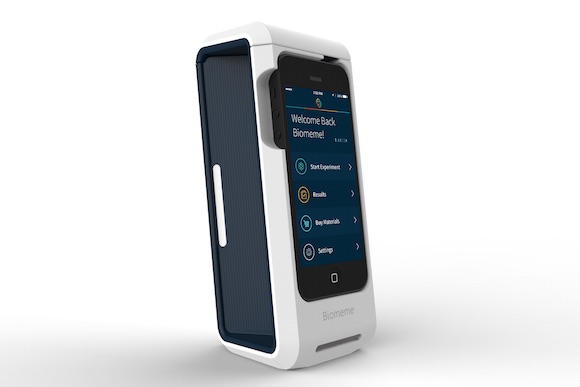What if you could learn more about your health and your genetics using a device that fits in the palm of your hand? That's the idea behind Biomeme, a Philadelphia-based startup that packs the power of a DNA lab into an iPhone attachment. Thanks to their patent-pending process, tests can be performed anywhere at a fraction of the typical cost. The implications are huge.
“Right now, we choose supplements, make preventative care decisions, and treat patients based on generalities,” explains co-founder Max Perelman. “Access to one's genetic information makes it possible to personalize [care] to our specific needs. Of course, that's only about 10 percent of 'us' — molecular analysis is also increasing our understanding of the various viral and bacterial microbiomes within and on us.”
Co-founders Marc DeJohn and Jesse vanWestrienen met at a previous startup where they worked on developing low-cost mobile molecular diagnostics. In 2012, DeJohn approached his longtime friend Perelman about creating a technology that would enable personal molecular analysis anywhere. The three of them called the new company Biomeme.
“[It's] a nod to Richard Dawkins' concept of a 'meme,' or cultural idea, spreading throughout the population in a similar fashion to genes,” explains Perelman.
They began prototyping in vanWestrienen's grandmother-in-law's basement in New Mexico. The trio showed their early work and preliminary data to Jared Tarbell, one of the co-founders of Etsy, and he provided their first angel investment. Then in April 2013, the team moved to Philadelphia to attend DreamIt Ventures' inaugural DreamIt Health accelerator. Maximilian Maksutovic joined the team a month later to lead their software development.
After graduating from DreamIt Health, the Biomeme founders decided to stay in Pennsylvania.
“We'd formed close ties with the local angel and seed investment community, as well as with our early healthcare partners,” recalls Perelman. “In addition to follow-on investments from DreamIt Ventures and Independence Blue Cross, Ben Franklin Technology Partners of Southeastern PA stepped up to invest $400,000 as part of our seed round.”
Biomeme then moved into NextFab Studio, a local “gym for innovators,” to continue prototyping. The company was eventually accepted into the University City Science Center's Digital Health Accelerator, which enabled them to ramp up a clinical study with Drexel Medicine's Women's Care Center. Via that partnership, they successfully tested their handheld sexually transmitted infection (STI) panel for Chlamydia, Gonorrhea and Trichomonas.
“Philadelphia itself is a great place to locate,” says Perelman. “It's much more affordable than many other cities, and is conveniently located within the New York City, Baltimore, Washington, D.C. corridor where many of our initial customers are located. We also have access to fantastic graduates from the area, and have hired staff from Drexel, Penn, Swarthmore and Princeton.”
Recently, Biomeme moved into new offices on N. 3rd Street in Philadelphia's Old City neighborhood. This area has become a hub for tech companies and creative types, earning it the nickname “N3rd [nerd] Street.”
“Old City is a fantastic location for a startup,” insists Perelman. “Not only is it an easy commute by bike or public transportation, but we have a lively restaurant and café scene, as well as great neighborhood events.”
Thanks to the tight-knit neighborhood, the Biomeme team has also been able to form close relationships with other companies such as software firm Tamman, co-working space IndyHall and fellow tech startup CloudMine.
June 15 through 18, the BIO International Convention is coming to Philadelphia and Biomeme is excited to have a front-row seat.
“We were thrilled to hear the 2015 BIO International Convention would be held in Philadelphia,” says Perelman. “We're looking to line up strategic partnerships with providers excited to test our STI panel within their network, assay developers that want to deploy their lab-based molecular tests on our mobile platform, and [connect with] users looking for a lab-free system that enables anyone to generate lab-grade diagnostic results anywhere.”


